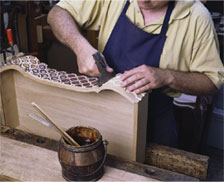marquetry, ancient cylinder recordings, ISOC's undemocratic board

First up. Could marquetry be automated? It’s the process of making very complex patterns with inlaid veneer wood . I’ve always though of veneer as being a bit cheap, because of all the veneer particleboard furniture you can get these days, but real wood veneer can actually have aesthetic purposes if you’re mixing different kinds of woods. Or, you can use it to have a surface of some very high quality wood (like oak) which would expensive to get solid. And also destructive to the environment. So, question is, could you make a machine that could automatically do inlaid veneers on a production line? As complicated as these exhibited at the Getty?
Next. University of California at Santa Barbara. Party school? No doubt. But nonetheless their library has produced this fine online collection of ancient cylinder recordings from the turn of the 20th century. Voices out of the past. Too cool.<div class="floating_right"> </div>
</div>
Finally. ISOC is the Internet Society , a non-profit organization based in the US chartered to uphold the principles of the internet. It’s an organization that has a slightly bizarre history, like a lot of techie organizations that try to do something non-technical. Oh well. I want to draw your attention to the year 2001. Put yourself in Salt Lake City, Utah, December 8 and 9.
Prior to that year ISOC was a membership organization . Technically speaking that means that the members have ultimate control over what the organization does. (This is non-profit lingo.) But at that meeting, the Board of Trustees of ISOC decided to change the rules. Using a virtual majority vote they exercised their power to effectively eliminate membership oversight and put in place a self-perpetuating board . Which means that the board as of that meeting can now stay on the board basically forever and maintain control of the organization perpetually.
Now you can argue plenty that the board is well meaning but the Salt Lake City meeting minutes show that only one or two of the trustees seem to have been concerned about the change.<blockquote>
Another point of contention is the definition of the election or nomination to the board: Manuel points out that the proposed wording would in theory allow for a self perpetuating board. This is however mitigated by the term limit provisions of the bylaws, but Marty points out the term limits allow someone to serve on the Board for six out of every seven years, and therefore a group can control the ISOC Board almost in perpetuity by having Trustees take one year off after every two consecutive terms.</blockquote>
Marty’s analysis is correct, by the way.
Another interesting point is that if you look at ISOC documents (bylaws, etc.) from before the Salt Lake City meeting, you can do that using the Wayback Machine at the awesome Internet Archive. According to the bylaws just prior to the S.L.C. meeting , the bylaws require that notice be given of proposed changes … presumably so that people who are concerned can raise their voices. In this case, notice was not given . So, you can easily form the opinion that the change from a membership body to a self-perpetuating board was made in a slightly undemocratic way.
[UPDATE 2006-02-19: I was wrong about notice, because the bylaws don’t actually require notice of the changes to be given to anyone but the Trustees. They were (apparently) given notice.]
You might well ask “who cares?” and I for one might not care all that much, because as people have pointed out, ISOC is doing good work. Right now. However it bothers me that this change was made and it seems that ISOC doesn’t want to repair it. ISOC’s Board claims that they are membership-driven, and operationally, they are … for now. But what will happen in the future? Another Salt Lake City-style power grab? It’s hard to say. And they are in charge of .ORG registrations because of their speaking-for-the-public cred.
What can you do about it? Well, start by complaining, the squeaky wheel gets the grease. Or considering running for the board on a reform platform. That’s what I would do if I didn’t hate travelling so much (they fly you to meetings around the world).